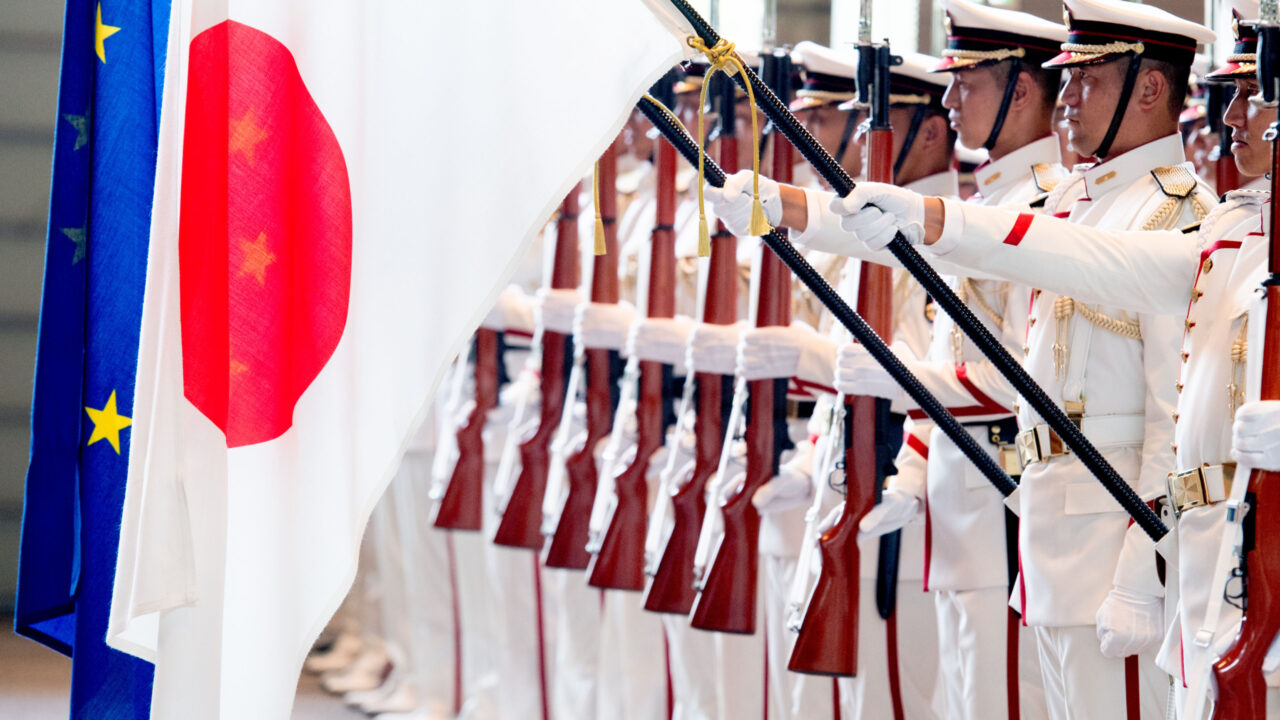Tokyo drift: War in Europe and Japan’s shifting strategy
Japan has clearly signalled that it will not stand on the sidelines of global crises. It is now committed to bold diplomacy and the protection of the rules-based international order
Russia’s full-scale invasion of Ukraine has been an abrupt wake-up call for Japan. The Kremlin’s nuclear threats and disruption of global peace and stability – as well as energy, food security, and supply chains – have led to remarkable political reactions and policy shifts not only in the West but also in Japan. Remarkably, Japanese political elites and voters have pushed for a general rethink of their country’s defence capabilities, regional dependencies, management of alliances, and Russia policy.
Japan has surprised many with its response to the invasion. Traditionally, the country has been hesitant and unsure of its role in international crises – not least due to the legal and constitutional restraints on its use of military force.
Engagement had long been the dominant theme of Japan’s Russia policy, especially under the Abe administration. Efforts to sign a peace treaty with Moscow and resolve the sides’ decades-long territorial dispute over the Northern Territories were high on Tokyo’s agenda. And access to Russian energy had become a strategic objective for Japan, particularly after the 2011 Fukushima accident led it to shift away from reliance on nuclear energy. Japan also wanted to improve its bilateral relations with Russia to create a regional security environment in which it could focus on the challenges from China and North Korea.
These objectives have now changed. Unlike in 2014 – when Russia annexed Crimea – Japan has strongly condemned the Kremlin’s “unilateral changes to the status quo by force”, as Prime Minister Fumio Kishida put it. Japan quickly aligned with its Western partners as part of the G7 and announced that it would impose sanctions on Russia – along with Belarus, which supported the invasion. As part of this, Japan imposed sanctions on Russian banks, froze Russian sovereign assets in Japanese banks, prohibited Japanese companies from investing in Russia, banned the export of defence and oil-refining equipment to Russia, and withdrew Russia’s trade status as a most favoured nation.
The Japanese government also departed from its traditional approach by using hard-line language. The country’s annual foreign policy report for 2022 describes Russia’s invasion as “an outrage that undermines the foundation of the international order not only in Europe but also in Asia”. Moreover, the Japanese government changed the official status of the Northern Territories from “sovereign territory” to “illegally occupied”. Most policymakers in Tokyo now acknowledge that there is no prospect of agreeing to a territorial settlement or peace treaty with Russia any time soon. Throughout all this, the Kishida administration has adapted its policies on not just Russia but also security and defence more broadly.
Nonetheless, Japan’s response in the energy sector has been less consequential. Tokyo eventually banned imports of Russian coal in April, but has not stopped its purchases of Russian oil and natural gas. At the G7 meeting in May, Kishida pledged to ban or phase out Russian oil. But he has since argued that Japan needs time to find alternative sources of energy and is reluctant to give up its interests in the Sakhalin 1 and 2 oil and gas projects. The administration expressed concern that, if Japan abandoned the projects and Russia or China bought its shares in them, this would eventually benefit the Kremlin and undermine Japanese sanctions.
The invasion has also unleashed a public debate in Japan about how the country can best defend itself in the event of an attack and shape alliances to improve its resilience. Russia’s actions have reminded Japanese citizens that their country is on the front line of regional conflicts, as it is close to not just Russia – which has recently expanded its military exercises in the region, including in cooperation with the Chinese – but also China and North Korea. China is making aggressive moves in the East China Sea, the South China Sea, and the Taiwan Strait, while North Korea has already conducted 31 missile tests this year (compared to eight last year) and may soon carry out its seventh test of a nuclear weapon.
Public support is a major strategic asset for Kishida – and he is making good use of it
Like many countries, Japan is now engaged in a debate about defence spending: the ruling Liberal Democratic Party has even stated its aspiration to increase this from 1 per cent of GDP to 2 per cent of GDP. Discussions of what were once long-term or taboo topics – such as the acquisition of a strike capability, revisions to defence clauses in the constitution, and (as suggested by former prime minister Shinzo Abe) nuclear sharing – have begun to gain traction. This follows both a rethink among decision-making elites and, more importantly, a dramatic shift in public opinion. According to one recent poll conducted by Yomiuri, 64 per cent of voters want Japan to strengthen its defence capabilities and 55 per cent support an increase in defence spending to 2 per cent of GDP.
Public support is a major strategic asset for Kishida – and he is making good use of it. With the “Kishida Vision for Peace” he presented at the recent Shangri-La Dialogue, the prime minister officially introduced a new direction in Japan’s grand strategy and defence policy. At the same time, he set out a path for dealing with regional and global challenges more broadly.
Kishida has clearly signalled that Japan will not stand on the sidelines of global crises. More than ever, he is demonstrating a commitment to bold diplomacy and efforts to protect regional stability and the rules-based international order. This is reflected in his attendance at the Shangri-La Dialogue and scheduled participation in the NATO Summit in late June. Japan’s alliance with the United States is once again at the forefront of Tokyo’s strategic calculations on the Indo-Pacific. However, other allies and like-minded partners – such as members of the Association of Southeast Asian Nations and the European Union – are key to Japan’s push to improve its resilience. The EU should build on its partnerships with Japan to increase its engagement with the Quad and the US on security in the Indo-Pacific, with the aim of enhancing its role in the region.
The European Council on Foreign Relations does not take collective positions. ECFR publications only represent the views of their individual authors.



